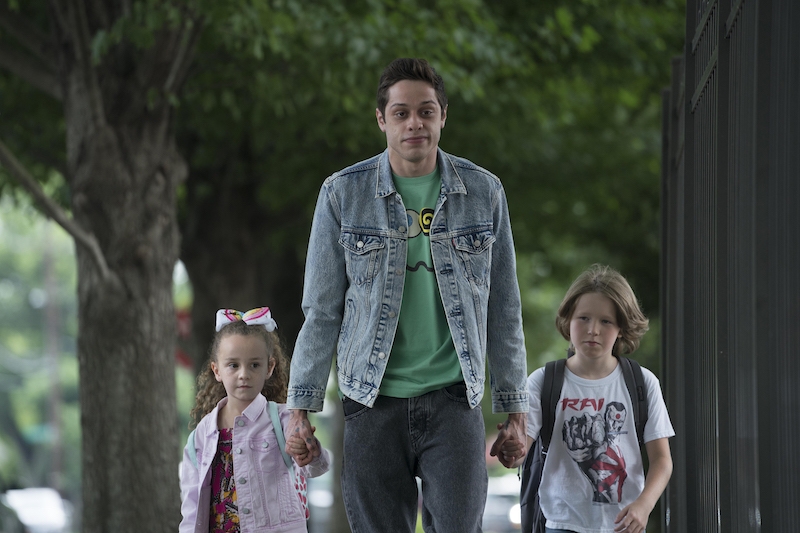
There are some tall people who look regular-sized until you see them in person. Pete Davidson is not one of those people. He looks like a stretched out human—all arms and legs and torso. (Well, I suppose we’re all all arms and legs and torso, but Davidson is somehow more so.) With his hooded eyes and thick lips, he’s handsome, in an offbeat way, but also, undeniably goofy looking. And because he’s so skinny and long, he’s a walking sight gag, something director Judd Apatow leans into in The King of Staten Island. (Note how many scenes he’s shown stooping down to walk with a small child.)
Davidson, who plays a fictionalized version of himself named Scott, is the ultimate man-child. Since his father, a firefighter, died when he was 7, he’s been depressed, listless, self-pitying. He spends most of his free time getting high with his buddies in the basement. He dreams of being a tattoo artist, but he isn’t particularly good at it yet—understandably, few of his friends are willing to let him practice on them. He also has Crohn’s disease, also true of Davidson. (In one scene, he goes into vivid detail about the gastrointestinal condition, much to the consternation of his companions. “Just trying to spread awareness,” he shrugs.)
Scott lives with his mother, a nurse named Margie (Marisa Tomei, ever lovely), who reluctantly enables his apathy. His younger sister (Maude Apatow), who is way more mature than he is, is heading off to college. Now he and Margie are on their own—a prospect neither of them particularly relishes.
The film’s action takes off when a 9-year-old boy named Harold stumbles upon Scott and his friends on the beach. Harold asks Scott to give him a tattoo of The Punisher. Only one of Scott’s friends strongly objects: “He’s just a kid!” The others are so high or bored or stupid, they don’t see the problem. It’s a funny/cringy scene—he’s not really going to do it…oh shit, he’s really going to do it—ending, inevitably, with the little boy screaming in pain and horror and bolting. Scott had only managed to ink one line.
Later that day, Harold’s father, Ray (Bill Burr)—a bald guy with a ginger mustache as thick as his New York accent—turns up at Scott’s house, accusing him of mutilating his son. Margie is sufficiently mortified and offers to pay for the laser removal. Eventually, Ray takes a shining to Margie and asks her out. Turns out, he’s a firefighter, just like Scott’s late dad. This doesn’t sit well with Scott. It’s possible, indeed probable, that he would’ve hated any man who romanced his mother—but the fact that Ray is a fireman infuriates him. He thinks it’s bizarre and creepy and a cruel thing to do to him: Scott has a theory that no firefighter should have a kid. The work is too dangerous. If they die, they leave the kid on his own. It’s heartless.
So The King of Staten Island is about Scott coming to grips with his father’s death, through the avatar of Ray. Ray, it turns out, is a good guy, a real sweetheart, although certainly a flawed human, just like the rest of us. Scott blindly hates him. The evolution of their relationship isn’t rushed or overly sentimentalized—it’s the heart of the film and actually quite touching.
Not everything works. Scott has a girlfriend of sorts, Kelsey (Bel Powley), whom he sleeps with on the regular but won’t commit to—he thinks he’s too damaged for her. I enjoyed the rapport between Scott and Kelsey, and her mission to make Staten Island—“the only place New Jersey looks down on”—the next hotspot, is a cute gag, but the relationship feels like a throwaway, particularly considering the prominence it gets in the film’s final act.
Apatow’s films are often accused of being too long—and, at two hours and 17 minutes, The King of Staten Island is no exception. I appreciate Apatow’s unrushed, companionable rhythms. But there’s an entire 15-minute set piece in the film—it involves a failed caper with Scott’s buddies—that could’ve been completely cut out. It’s a deus ex machina, an excuse to leave Scott in a predicament that drives the plot. And frankly, it’s lazy screenwriting.
That said, I enjoyed The King of Staten Island, and its deeply humane exploration of Scott’s lifelong rut. We root for Scott, even when he’s being a royal pain the ass, because he’s a good guy, who has been dealt a bad hand in life. The jury is out on whether or not Davidson is a good actor—or just good at playing himself. But he’s quite affecting here. In general, I think the world doesn’t need another movie about a man-child learning to grow up. But I found myself caring about this particular man-child, despite myself.
The King of Staten Island is available on VOD starting Friday, June 12.
